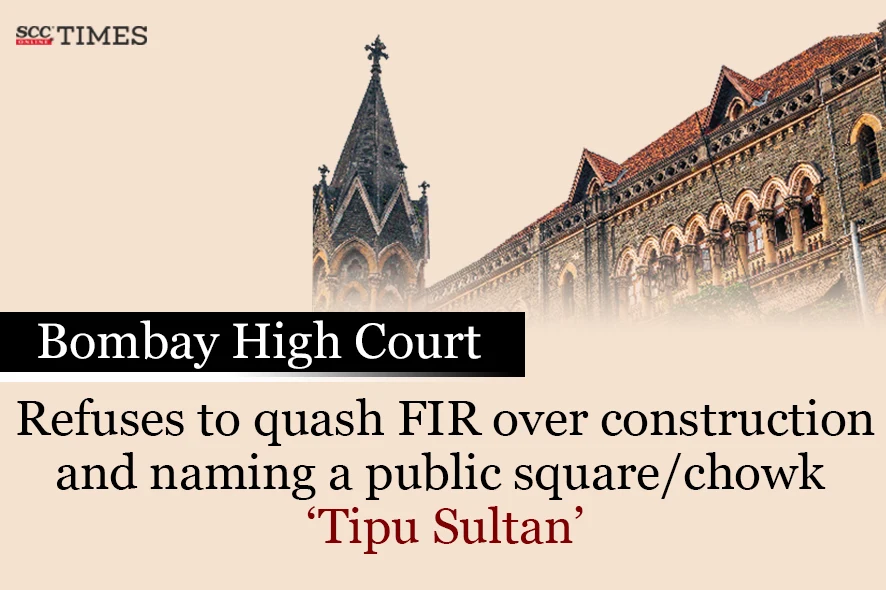Bombay High Court: The present application was filed by the applicant-MLA, seeking quashing of an FIR registered against him under Sections 153-A, 295-A, 504, 505(1) and 506 of the Penal Code, 1860 (‘IPC’), wherein he was accused of constructing a raised platform without obtaining the requisite permission and naming it ‘Tipu Sultan Chowk’, an act which allegedly incited communal tension between two communities. The Division Bench comprising Vibha Kankanwadi* and Sanjay A. Deshmukh, JJ., refused to quash the FIR while exercising their powers under Section 482 of the Criminal Procedure Code, 1973 (‘CrPC’). The Court held that the investigation was ongoing to determine who had erected the construction and whether proper permission had been obtained, while emphasizing that a public square could not be named by an MLA without following the procedures given in the Maharashtra Municipalities Act, 1965 ( the ‘1965 Act’) and the Maharashtra Municipal Corporations Act, 1949 (the ‘1949 Act’).
Background:
The applicant submitted that the FIR was filed with mala fide intention since there was admittedly a political rivalry. It was alleged by the respondent that the applicant had constructed a raised platform without obtaining any permission and named it as ‘Tipu Sultan Chowk’ which resulted in creating hatred amongst two communities.
The applicant argued that the respondent was trying to settle political scores as he was from a rival political group. He further alleged that there was no question of offence under Sections 153-A, 295-A, 504, 505(1) and 506 IPC getting involved in the matter as Tipu Sultan was the freedom fighter of India and great warrior and therefore, giving name of the said person could not attract any criminal prosecution.
The respondent submitted that there was some evidence of a construction in the chowk that was later demolished and questioned how the applicant obtained the alleged supplementary statement, especially since police records showed no copy was provided. It was alleged that the applicant had made no effort to prevent the illegal construction and the investigation records showed that the construction had been carried out under the supervision of a person related to the applicant. He further argued that there was also some evidence to show that the accused had made abusive comments on his social media Facebook account and Instagram against Shri Vinayak Damodar Savarkar and Shri Chhatrapati Shivaji Maharaj.
Analysis and Decision:
The Court noted that the alleged supplementary statement did not bear the signature of the person who had taken it down and how the copy of the same was in possession of the applicant. The Court observed that the applicant’s counsel had filed an affidavit stating that the document had been downloaded by the applicant from the informant’s Facebook page, but it had not been properly endorsed as a true copy. The Court condemned the act of producing a document obtained through improper means and held that it was the duty of the advocate representing the party to consider whether the document had come into the client’s possession through legal means. Merely because the client had requested its production, the advocate should not have risked presenting such a document before any Court of law without being able to explain the source from which the client had obtained it.
The Court observed that the investigation was still ongoing and that it was yet to be determined who had erected the construction in the chowk, whether permission for the construction had been obtained or the funds available to the MLA had been utilised for the construction. The Court noted that a public square (chowk), road, or place could not be named by an MLA on their own as there was a procedure under the 1965 Act as well as the 1949 Act, wherein the proposal had to be tabled before the authority concerned, i.e., the general body meeting of the elected members, and only after reaching a consensus could such a place be named accordingly.
The Court rejected the application, observing that the applicant, at one point, supported the act of naming the public square after Tipu Sultan, while at another, claimed innocence and these two positions were contradictory and could not coexist. Since the investigation was still ongoing, and the police report suggested there was some evidence and whether it was connected to the applicant was a different question. The Court held that this was not a fit case for exercising its powers under Section 482 CrPC.
[Farukh Shah v. State of Maharashtra, 2025 SCC OnLine Bom 2558, decided on 25-6-2025]
*Judgment authored by: Justice Vibha Kankanwadi
Advocates who appeared in this case :
For the Applicant: S.S. Kazi, Advocate
For the Respondents: A.R. Kale, APP and Chetan B. Chaudhari, Advocate








